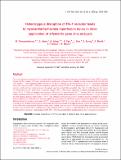| dc.contributor.author | Thirunavukkarasu, M | en_US |
| dc.contributor.author | Addya, S | en_US |
| dc.contributor.author | Juhasz, B | en_US |
| dc.contributor.author | Pant, R | en_US |
| dc.contributor.author | Zhan, L | en_US |
| dc.contributor.author | Surrey, S | en_US |
| dc.contributor.author | Maulik, G | en_US |
| dc.contributor.author | Menon, V P | en_US |
| dc.contributor.author | Maulik, N | en_US |
| dc.date.accessioned | 2015-05-04T15:28:07Z | |
| dc.date.issued | 2008 | en_US |
| dc.identifier.citation | Thirunavukkarasu, M, S Addya, B Juhasz, R Pant, L Zhan, S Surrey, G Maulik, V P Menon, and N Maulik. 2008. “Heterozygous disruption of Flk-1 receptor leads to myocardial ischaemia reperfusion injury in mice: application of affymetrix gene chip analysis.” Journal of Cellular and Molecular Medicine 12 (4): 1284-1302. doi:10.1111/j.1582-4934.2008.00269.x. http://dx.doi.org/10.1111/j.1582-4934.2008.00269.x. | en |
| dc.identifier.issn | 1582-1838 | en |
| dc.identifier.uri | http://nrs.harvard.edu/urn-3:HUL.InstRepos:15035057 | |
| dc.description.abstract | This study addresses an important clinical issue by identifying potential candidates of vascular endothelial growth factor (VEGF) signalling through the Flk-1 receptor that trigger cardioprotective signals under ischaemic stress. Isolated working mouse hearts of both wild-type (WT) and Flk-1+/− were subjected to global ischaemia (I) for 30 min. followed by 2 hrs of reperfusion (R). Flk-1+/− myocardium displayed almost 50% reduction in Flk-1 mRNA as examined by quantitative real-time RT-PCR at the baseline level. Flk-1+/− mouse hearts displayed reduction in left ventricular functional recovery throughout reperfusion (dp/dt 605 versus 884), after 2 hrs (P < 0.05). Coronary (1.9 versus 2.4 ml) and aortic flow (AF) (0.16 versus 1.2 ml) were reduced in Flk-1+/− after 2 hrs of reperfusion. In addition, increased infarct size (38.4%versus 28.41%, P < 0.05) and apoptotic cardiomyocytes (495 versus 213) were observed in Flk-1+/− knockout (KO) mice. We also examined whether ischaemic preconditioning (PC), a novel method to induce cardioprotection against ischaemia reperfusion injury, through stimulating the VEGF signalling pathway might function in Flk-1+/− mice. We found that knocking down Flk-1 resulted in significant reduction in the cardioprotective effect by PC compared to WT. Affymetrix gene chip analysis demonstrated down-regulation of important genes after IR and preconditioning followed by ischaemia reperfusion in Flk-1+/− mice compared to WT. To get insight into the underlying molecular pathways involved in ischaemic PC, we determined the distinct and overlapping biological processes using Ingenuity pathway analysis tool. Independent evidence at the mRNA level supporting the Affymetrix results were validated using real-time RT-PCR for selected down-regulated genes, which are thought to play important roles in cardioprotection after ischaemic insult. In summary, our data indicated for the first time that ischaemic PC modifies genomic responses in heterozygous VEGFR-2/Flk-1 KO mice and abolishes its cardioprotective effect on ischaemic myocardium. | en |
| dc.language.iso | en_US | en |
| dc.publisher | Blackwell Publishing Ltd | en |
| dc.relation.isversionof | doi:10.1111/j.1582-4934.2008.00269.x | en |
| dc.relation.hasversion | http://www.ncbi.nlm.nih.gov/pmc/articles/PMC3865673/pdf/ | en |
| dash.license | LAA | en_US |
| dc.subject | ischaemia | en |
| dc.subject | reperfusion | en |
| dc.subject | Flk-1 | en |
| dc.subject | myocardium | en |
| dc.subject | affymetrix gene chip | en |
| dc.subject | gene expression | en |
| dc.title | Heterozygous disruption of Flk-1 receptor leads to myocardial ischaemia reperfusion injury in mice: application of affymetrix gene chip analysis | en |
| dc.type | Journal Article | en_US |
| dc.description.version | Version of Record | en |
| dc.relation.journal | Journal of Cellular and Molecular Medicine | en |
| dc.date.available | 2015-05-04T15:28:07Z | |
| dc.identifier.doi | 10.1111/j.1582-4934.2008.00269.x | * |
| dash.authorsordered | false | |


